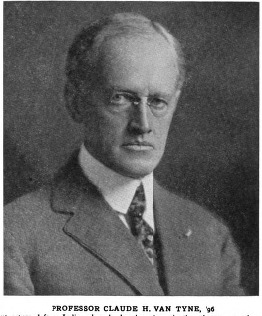Claude Halstead Van Tyne
If the role of U of M in the Great War can only be measured by the personal efforts and activism of the University's student, faculty and staff body, then the person of Claude Halstead Van Tyne (1869-1930) truly deserves a separate page in this project. Born in Michigan, having studied at the University of Michigan for his bachelors, then Europe and later the Graduate School of the University of Pennsylvania where he earned his Ph.D in 1900, Van Tyne was a fine historian, professor and Chair of the Department of History at U of M when war broke out. Upon the outbreak of war, and at America's entry, Van Tyne's position was unambiguous: war preparedness, sensitization of both the academic and non-academic world on the main issues of the war, and mobilization of the American people in support of the Allied cause - saving democracy. A Michigan Alumnus editorial found him to be "one of the most active" of the University speakers helping to enlighten the public on the issues of the war. When the war began, he went, often on invitation, to various parts of the state of Michigan to lecture on the war issues. About Christmas time in 1917, he joined the educational campaign of the National Security League, and the League arranged for him lectures before large groups of teachers and business men's clubs in places including most of the large cities of Ohio, Indiana, Illinois, and Michigan. The University even released him about end of March 1918 to go to New York City and aid in the League's big campaign there. For some three months he "spoke nearly every evening and sometimes three times a day in the city, or in other cities within a radius of one hundred miles." For the most part, he performed editorial work in the League's office, answering pro-German propaganda and writing articles that might serve the cause. He himself was to opine that the most important of those articles was his pamphlet, "Democracy's Educational Problem." Here, he suggested the way forward in the type of post war curriculum changes necessary for colleges and universities. He debunked the misrepresentations of US history, particularly with regard to Anglo-US relations. He then suggested that critically presenting the history in scholarship and to the students in the class room would go a long way to improve Anglo-US relations and world peace, that the post war US educational system had to be designed in a way that certain American ideas be everywhere impressed upon American youth. Such an educational system was to imbue the American citizen with a comprehension of democratic principles, and make democracy safer
During the months of April, May, and June 1918, when the war activities in New York City were at the highest pitch, Van Tyne met and talked with many of the most distinguished persons in the New York metropolis. He spoke at patriotic gatherings, including one attended by the Associated Artists of New York, where he educated them on war issues. In some of the meetings, he was accompanied by his very close friend with whom he shared similar views about the war and about America's role - Professor Hobbs. Both of them delivered patriotic talks in high profile gatherings and meetings. His patriotic meetings and war activism took him to strange places. In his own words, "the vicissitudes of liberty loan campaigning got me strange platform fellows. Imagine the solemn professor of history speaking from the same platform with Charlie Chaplin ! Think of me, if you can,... with the vision of the dignified professor standing by the side of Guy Empey, who auctioned off the autographed picture of President Wilson, while I took down the names of the bidders....There is an amusing contrast in the places and audiences to which one is sent."
Late in May and early June 1918, Van Tyne visited some twenty large cities of the East, where he talked about war issues to the teachers assembled by order of the school boards. He spent July lecturing at a number of university and college summer schools. He estimated that for a period of six months in 1918, he "had travelled 12,000 miles, and talked to over 140,000 people in eleven different states." What a unique way for a university professor to patriotically serve his country in time of war! He died of illness on March 15, 1930, and for his academic accolades and contribution to scholarship, he posthumously received the Pulitzer Prize.
Note: For more on Van Tyne, see
Leland, Waldo G. "Claude Halstead Van Tyne (1869-1930)," Proceedings of the American Academy of Arts and Sciences 70,10 (Mar., 1936): 588-59.
The Michigan Alumnus 25, 237 (Oct., 1918): 13-15.
Van Tyne, Claude H. "Democracy's Educational Problem," Michigan History Magazine 3,1 (Jan., 1919): 82-92.

